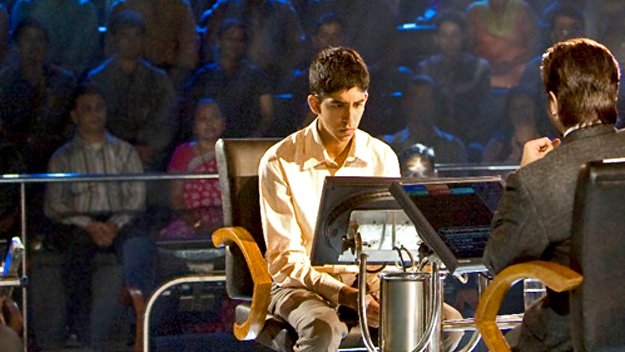Slumdog Millionaire
With his latest film Boyle has made something bold and beautiful.
Plot summary
A Mumbai teen who grew up in the slums, becomes a contestant on the Indian version of "Who Wants To Be A Millionaire?" He is arrested under suspicion of cheating, and while being interrogated, events from his life history are shown which explain why he knows the answers.

Looking at his CV, Danny Boyle hasn’t been the most typical of directors. The guy’s got a fair few feathers in his cap. In fact if his film career was a cap full of feathers (bear with me) it would be one of the more funky, outrageous and bizarre looking hats out there. We’ve seen him move from the decade defining brilliance of Trainspotting, to the lesser backpacking sandiness of The Beach, towards the eerily realistic zombie film 28 Days Later and finally the aesthetically astonishing sci-fi thriller Sunshine. His ability and willingness to constantly switch genres and try something completely different makes him a contender for this generation’s Stanley Kubrick.
With his latest film Boyle has made something bold and beautiful. It is the story of Jamal (Dev Patel, from Skins) an impoverished, orphaned child from Mumbai, and his chance success on India’s version of Who Wants to Be a Millionaire? To the shock of the suspicious, glitzy host of the show, Jamal moves through the rounds on his way to the 22 million rupees prize, drawing upon memories of his childhood as a homeless wanderer alongside his brother and the search he has still to continue for Latika, the love of his life.
The game show acts as a structural device for the telling of Jamal’s life, punctuating each separate story with every question. This technique is somewhat difficult to accept at first, the predictability that the question with align quite nicely with the protagonists memory is simply too easy. The first third of the film is uncomfortable in that there is an odd juxtaposition of the hard hitting, City of God style depiction of Jamal, his brother and Latika’s dangerous adventures as begging children in the roughest areas of India, with the exaggerated, destined nature of the Jamal’s journey towards unknown wealth.
As the film winds on however, all your reservations and cynicism disappear. The action is intense at times, and the realities of the life many parent-less children must endure in India and the lengths they must go to in order to survive are depicted without restraint. Beaufoy’s script is, however, speckled with humour that acts as welcome joviality to the harsh life of the children. The overly deliberate link of the game show with Jamal’s life, once the love story begins to gather momentum, too becomes just part of Boyle’s grand scheme.
Through the beautiful cinematic visuals of India and the destined fate of the two lovers you begin to see Boyle’s unique creation for what it is. He has drawn upon the culture of India itself, looking towards Bollywood for inspiration, and infused it with the ideas of destiny that are so intrinsic to India’s culture to make a film that is unashamedly sentimental as much as it is a raw depiction of ‘slumdog’ life. The fairytale nature of the story of Jamal and Latika and the happy ending that you know is coming does nothing to stop your lust to see it occur.
Boyle has returned to great form and created a distinctive mixture of west meets east. I can’t wait to see what he attempts next.











COMMENTS